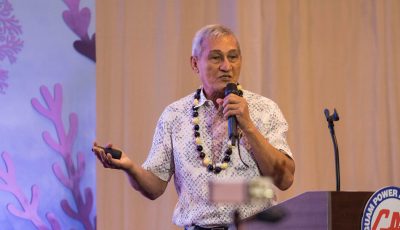SHEFA mulls waiving GPA rule
A Saipan scholarship program that is funded by the license fees of a dwindling number of poker arcades wants to make it easier for first-time applicants to go to college.
Talks to eliminate the grade point average requirement of first-time applicants for the Saipan Higher Education Financial Assistance program became a focal point of discussion during the SHEFA board meeting last week.
It was not clarified at the meeting whether the high school GPA of first-time applicants or previous semester GPA of first-time applicants is to be overlooked.
SHEFA board chair Oscar Babauta took the lead role in pushing for the abolition of the high school GPA requirement for incoming college freshmen that are first-time SHEFA applicants.
Babauta questioned whether the high school GPA of SHEFA applicants is relevant to a students’ pursuit of college.
“[We] seriously need to openly discuss the GPA for new applicants [of the SHEFA program]. Our prior denials of applicants are mainly because of high school GPA. I wanted to find out if we can further discuss this and deliberate more to come out with a solution and hopefully amend our rules and regulations,” said Babauta.
Babauta pointed out that denying SHEFA scholarship to students that strive to attain good grades in college but have slightly slacked off during high school sets a bad example.
“A student applies for the fall semester, having gotten fresh out of high school in June of the same year. We can consider eliminating this requirement so that if he/she wanted to continue for the spring semester, we can follow through with his/her fall GPA,” Babauta told the board. “What I’m trying to say is the possibility of considering the elimination of the GPA for the first semester after high school or the first application of the students.”
SHEFA vice chair Juan Tenorio shared that SHEFA did not exist during his time.
“I’m going to use me as an example,” said Tenorio. “I bombed in high school. I had bad grades in high school. I admit it myself. But then, there was no SHEFA that time, and I didn’t receive a CNMI Scholarship after the first semester. I didn’t get it in the first semester but I got it in the next. I’m just using myself as an example,” he said.
Babauta told board members that he merely wants to raise the issue for their discussion.
“You can tell from the individual that they really want to pursue post-secondary education by finding a way for appealing and re-review of their application. I don’t know if some of the board members have been approached,” he said. “I took it upon myself to see if we can have an open discussion on this matter and try to adopt a set of policies that would eliminate the requirement of the high school GPA for the first semester.”
Board member Ursula Lifoifoi-Aldan questioned how students are to be deemed eligible for SHEFA support if the GPA requirement is waived.
After more scuffling, Tenorio spoke up, saying the goal of SHEFA is to “provide assistance to whoever wants to further their education.”
“Let’s look at all the possibilities that we have. Everything has to go through the board to decide on what to do for the program. The CNMI Scholarship Office is already doing a no-GPA entry. If you [fail] after the first semester then I’m sorry, you’re not going to receive any more,” he said, a few moments before the meeting was adjourned.



























